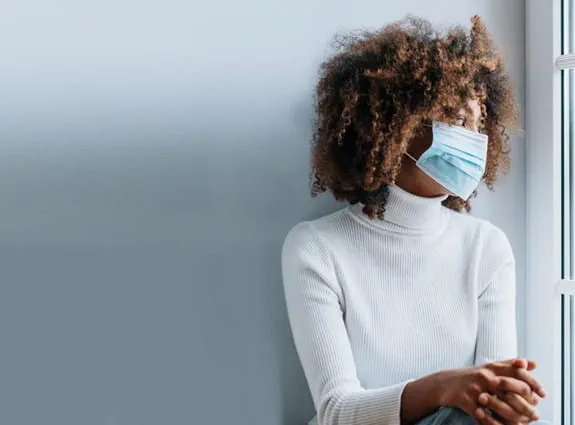
Cancer and COVID-19 vaccines
Information about COVID-19 vaccines for people with cancer is evolving. You may have questions and feel uncertain, frustrated or overwhelmed as vaccines roll out across Canada. At the Canadian Cancer Society (CCS), we’re working to stay up to date with the latest information and recommendations for people with cancer and survivors. We are reviewing research and guidance regularly so that we can continue to keep you informed. We will keep this page updated with new information as we receive it.
Is CCS adopting a mandatory vaccination policy?
Can I get the COVID-19 vaccine if I have cancer?
The COVID-19 vaccine is safe for most people with cancer. Talk to your healthcare team about if you should receive the vaccine. They will be able to determine if the benefits outweigh the risks for you. They can also determine which of the approved COVID-19 vaccines is right for you, and the best timing of the first, second and additional doses, based on your unique circumstance.
Vaccines work by stimulating the immune system to produce antibodies to fight a disease. You may be immunosuppressed (have a weak immune system) due to cancer or its treatment. Currently, the COVID-19 vaccine is offered to people who are immunosuppressed and who meet the required age for use. But the vaccine may not be able to stimulate your immune system well enough to protect against COVID-19.
Not everyone with cancer is immunosuppressed. Talk to your healthcare team for more information.
How is the vaccine being rolled out in my province or territory? When should I get my doses?
Talk to your healthcare team about the best timing for you to receive each of your vaccine doses, based on your unique circumstance.
Provinces and territories are rolling out vaccines differently. Check your eligibility for each of your doses on your provincial or territorial government’s website. Contact them if you have any questions or concerns.
- Alberta
- British Columbia
- Manitoba
- New Brunswick
- Newfoundland and Labrador
- Northwest Territories
- Nova Scotia
- Nunavut
- Ontario
- Prince Edward Island
- Quebec
- Saskatchewan
- Yukon
What has CCS done to advocate for people with cancer to be prioritized to receive the COVID-19 vaccine?
The COVID-19 vaccine has helped make the world safer for everyone, including people with cancer and cancer survivors. We know that people with cancer may be at risk for more serious outcomes of COVID-19, which is why we advocated to governments to make sure that Canadians with cancer were prioritized as vaccines rolled out.
CCS strives to be the voice for Canadians affected by cancer. We asked governments to:
- clearly identify when people with cancer and survivors will be vaccinated
- prioritize people with cancer and survivors with others who are at risk of more severe disease, and ensure that they have access to the first, second and additional doses of the vaccine before the general population
- support more research and monitoring of the outcomes of COVID-19 vaccines for people with cancer and survivors
- empower healthcare providers to determine the best timing of all doses for their patients based on their unique circumstances
- make vaccination of healthcare workers mandatory across all public and private settings
- implement strategies that decrease barriers to accessing vaccines including those faced by underserved and racialized communities
We will continue to advocate for important issues facing Canadians affected by cancer, which include timely access to vaccines for high-risk and vulnerable populations. We will also continue to call on governments to make information more accessible and broadly known.
Read our statement on vaccine prioritization for people with cancer.
I need help with a personal situation or unique circumstance related to cancer and the pandemic. How can CCS help me?
We have free and confidential services available to help you find community and connection from the comfort of your home. You can connect with us and others across the country through CancerConnection.ca or call our toll-free Cancer Information Helpline at 1-888-939-3333. We also have cancer and COVID-19 resources available.
I have concerns about the vaccine rollout. How can I make my voice heard?
Sharing your concerns directly with your elected officials is one of the best things you can do to hold them accountable and ensure they know the vaccine rollout is important to their constituents. You can find your local representative in our key contacts list.
We also have a dedicated volunteer group for advocacy called CCS Voices For Change. You can sign up to get more information and help us support people with cancer through the pandemic.
What is CCS doing to advocate for people with cancer during the pandemic?
Is CCS partnering with other organizations to help people stay safe during COVID-19 and get vaccinated?
CCS has partnered with 19 To Zero, a group of academics, public health experts, behavioural economists and creative professionals that are dedicated to promoting safe behaviour and vaccinations during COVID-19. CCS and 19 To Zero are united against COVID-19 and know that vaccinations save lives.
Find out more about 19 To Zero.
